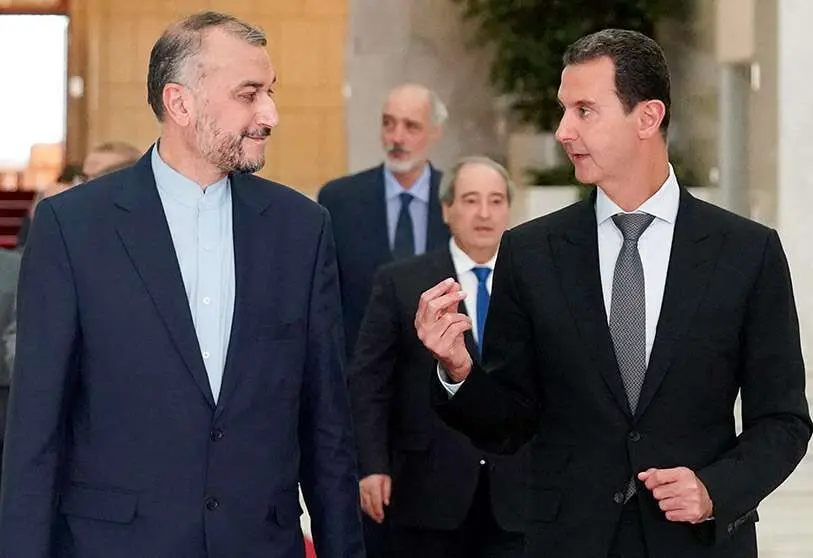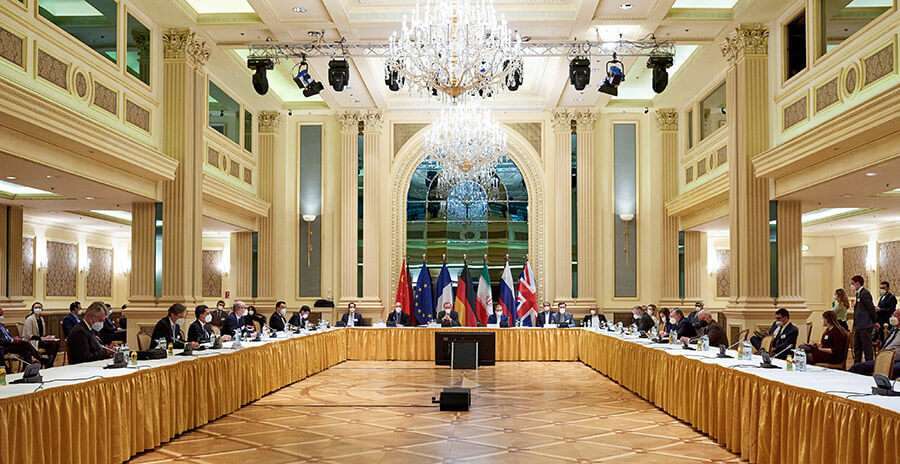Syria and Iran strengthen economic cooperation to counter "oppressive sanctions imposed by enemies"

The reactive Iranian-Syrian partnership, established since the 2006 Lebanon war as the Axis of Resistance, is strengthening ties amid the US-imposed economic siege, backed by the international community through sanctions. The material devastation that both countries are experiencing, significantly aggravated by the COVID-19 crisis, has pushed their leaders to join forces to reverse an adverse scenario that is rapidly eroding their positions of power.
Syrian President Bashar al-Assad received the delegation of the newly inaugurated Iranian Foreign Minister Hossein Amirabdollahian at the Presidential Palace on Sunday. The Persian foreign minister was full of praise for the Syrian leader, even highlighting the "successful holding" of the May presidential elections in which he won with more than 95 per cent of the vote. The terms of the conversation covered "issues of mutual interest" such as political and military cooperation and the shaping of the new regional order. Al-Assad thanked his interlocutors for Tehran's renewed support.

Syrian Foreign Minister Faisal Mekdad was also present during the dialogue with al-Assad. Hours earlier, in fact, the Persian foreign minister had been received by his counterpart at Damascus airport. Immediately after the reception, the Iranian foreign minister held a preliminary meeting alone with Mekdad, in which they discussed the latest developments in the region in the wake of the crisis in Afghanistan and cooperation ties in economic matters, the most important topic of the meeting.
"Iran and Syria are working on a plan for active development of economic and trade cooperation to counter oppressive sanctions imposed by the enemies," Amirabdollahian revealed after the summit, referring to agreements reached by the two countries in January 2019. At the time, Syrian Prime Minister Imad Khamis and Iranian Vice President Eshaq Yahanguiri, second-in-command to Hassan Rohani, signed an 11-point document sealing their strategic partnership in various economic sectors. A partnership invoked "for the long term" with a series of deadlines yet to be met.

Iran has injected a total of $5.6 billion into the al-Assad regime over the past decade, according to The Syria Report. The amount has gone mainly to the oil and electricity sectors with the aim of extending its tentacles over the Syrian economy. A long-distance race in which it has competed with Russia and from which the Syrian dictator has been greatly favoured. At the same time, Damascus and Tehran have reportedly tried to weave connections with other countries that also face a sanctions regime, such as Venezuela, in order to boost a parallel economy capable of sustaining itself in this framework of weakness.
The visit of the new Persian minister is a declaration of intent by the new Iranian government led by Ebrahim Raisi. The president-elect and former head of the judiciary, who took office on 5 August, is trying to tie down one of his regional partners as negotiations for the revival of the nuclear deal stall. The Joint Comprehensive Plan of Action (JCPOA) hangs in the balance and Tehran seeks to strengthen its position at a delicate time for the US after its abrupt withdrawal from Afghanistan.

The stability of the al-Assad regime depends heavily on Iranian support, which began during the outbreak of the Syrian civil war. Tehran provided funds, troops and weapons to Syrian government forces in order to appease the insurgents and maintain a favourable status quo. All this with Moscow's involvement. Minister Amirabdollahian made this point, describing Syria as a 'land of resistance'. The Persian foreign minister also underlined the joint work on the ground and the joint victories achieved. An action that brought with it the frontal rejection of the international community and provoked the initiation of sanctions against the Syrian regime after the atrocious repression against the civilian population.
Tehran circumvented restrictions after suspending its nuclear programme when the JCPOA was signed during the Obama administration, but the sanctions package against the Islamic Republic was resumed and increased after the US unilaterally withdrew from the nuclear deal in 2018 under Donald Trump. This decision triggered the resumption of uranium enrichment work and the restart of Persian nuclear targets. In any case, the sanctions have seriously wounded Iran, a country in crisis that experienced the latest wave of anti-regime protests in mid-July.

The Persian foreign minister's visit came a day after an international summit in Baghdad attended by representatives of Egypt, Jordan, Qatar, France, Iran, Saudi Arabia, the Emirates, Kuwait, Turkey and Iraq to discuss the latest movements of the tectonic plates that hold the Middle East together. Syrian and Iranian news agencies agree that Minister Amirabdollahian conveyed the terms of the talks to President al-Assad, who was not represented at the meeting. Ties are growing stronger.








